Summary Overview
Commissioning Services Market Overview
The global commissioning services market is witnessing consistent growth, driven by its critical role in ensuring the successful start-up of complex projects across industries such as energy, manufacturing, construction, and infrastructure. This market encompasses a wide range of services, including pre-commissioning, functional testing, system validation, and final handover. Our report provides an in-depth analysis of procurement trends, highlighting cost-saving strategies and the integration of advanced tools to enhance commissioning processes.
Key future challenges in commissioning services include managing project timelines, ensuring compliance with safety and quality standards, and addressing workforce skill shortages. The adoption of digital tools and strategic project management is crucial for optimizing commissioning workflows and maintaining long-term competitiveness. As global demand for infrastructure development grows, organizations are utilizing market intelligence to improve efficiency and mitigate risks.
The commissioning services market is expected to maintain a steady growth trajectory through 2032, with key highlights including
-
Market Size The global commissioning services market is projected to reach USD 9365.12 Million by 2032, growing at a CAGR of approximately 6.49% from 2024 to 2032.
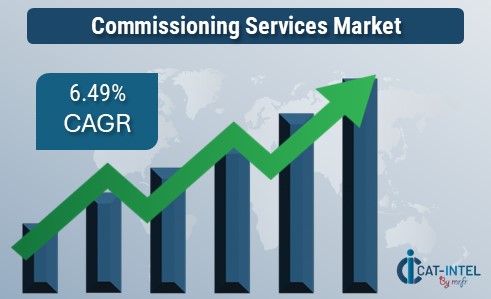
-
Sector Contributions Growth in the market is driven by -
Energy Sector Expansion The rise of renewable energy projects, power plants, and grid modernization efforts. -
Infrastructure Development Increasing demand for seamless project execution in construction, transport, and industrial automation. -
Technological Advancements and Innovations Digital commissioning platforms and real-time monitoring tools are enhancing precision and efficiency in project execution. -
Investment Initiatives Companies are investing in advanced simulation technologies, training programs, and automated testing systems to improve commissioning outcomes. -
Regional Insights Asia-Pacific and North America are key contributors, driven by large-scale infrastructure and energy projects in these regions.
Key Trends and Sustainability Outlook
-
Digital Transformation Integration of advanced software tools for documentation, issue tracking, and system integration, improving transparency and accuracy in commissioning. -
Advanced Equipment Testing Increased adoption of automated testing and validation tools to streamline processes and reduce human errors. -
Focus on Safety and Compliance Strengthening compliance frameworks and safety protocols to minimize risks during commissioning. -
Sustainability Practices Growing emphasis on sustainable commissioning services to reduce environmental impact and enhance energy efficiency. -
Workforce Upskilling Investments in training programs to address skill gaps and ensure a qualified workforce for complex projects.
Growth Drivers
-
Infrastructure Boom Rapid urbanization and industrial growth are driving demand for commissioning services to support timely project completion. -
Energy Transition Expanding renewable energy projects, such as wind and solar farms, require specialized commissioning expertise. -
Regulatory Compliance Adherence to stringent safety and operational standards in energy, manufacturing, and construction industries. -
Sustainability Goals Emphasis on green commissioning practices to meet environmental standards and achieve energy efficiency targets. -
Customization Needs Rising demand for tailored commissioning services that address specific project requirements and regulatory frameworks.
Overview of Market Intelligence Services for Commissioning Services
Recent analyses have identified key challenges such as the complexity of multi-stakeholder projects and fluctuating project costs. Market intelligence reports offer actionable insights, enabling companies to enhance vendor collaboration, optimize resource allocation, and improve risk management. These insights assist organizations in adhering to safety and quality standards while controlling costs and maintaining project schedules.
Procurement Intelligence for Commissioning Services Category Management and Strategic Sourcing
To stay competitive, organizations are refining procurement processes through spend analysis and vendor evaluation to ensure optimal resource utilization. Effective category management and strategic sourcing are essential to reducing procurement expenses and ensuring the timely delivery of high-quality commissioning services. By leveraging actionable market intelligence, companies can streamline procurement strategies, enhance supply chain resilience, and achieve the best outcomes for their commissioning needs.
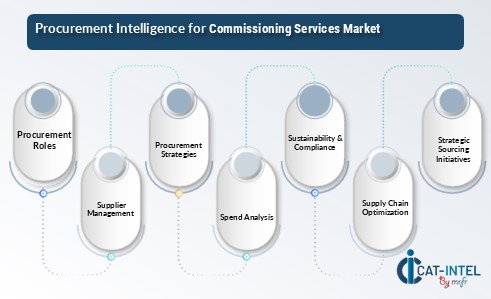
Pricing Outlook for Commissioning Services Spend Analysis
The pricing outlook for commissioning services is anticipated to remain relatively steady, with potential fluctuations influenced by several critical factors. Changes in operational costs, such as workforce wages, equipment expenses, and compliance with evolving regulatory standards, can significantly impact pricing trends. Additionally, the increasing complexity of infrastructure and energy projects is placing upward pressure on service costs.
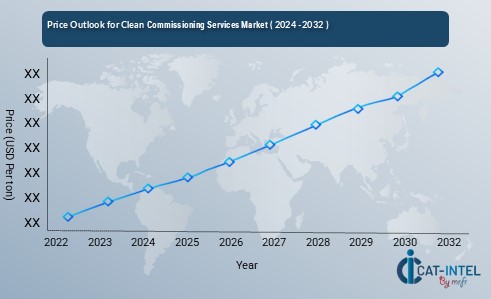
Graph shows general upward trend pricing for commissioning services and growing demand. However, there may be fluctuations influenced by economic conditions, technological advancements, and competitive dynamic.
Efforts to enhance project efficiency, streamline commissioning processes, and adopt advanced technologies will be vital in managing costs. Investments in digital commissioning tools, automation, and workforce training are essential for addressing pricing challenges.
Collaborating with service providers, diversifying sourcing strategies, and leveraging market intelligence platforms will be crucial for cost control. Despite these challenges, a focus on sustainability, regulatory compliance, and technological advancements will play a key role in effectively managing pricing dynamics.
Cost Breakdown for Commissioning Services Total Cost of Ownership (TCO) and Cost-Saving Opportunities.
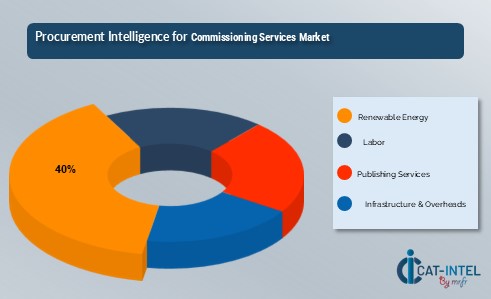
- Raw Materials (40%)
- Description This includes expenses related to hiring, training, and retaining skilled professionals for commissioning activities, along with costs for field technicians and project managers. Workforce costs also encompass expenses for compliance with safety and operational standards.
- Trends The growing demand for skilled commissioning professionals is driving investments in upskilling programs and certification courses. Additionally, the adoption of automation and digital tools is helping to reduce reliance on manual labor, improving cost efficiency.
- Labor (XX%)
- Publishing Services (XX%)
- Infrastructure & Overheads (XX%)
Cost-Saving Opportunities Negotiation Levers and Purchasing Strategies
In the commissioning services industry in Australia, strategic procurement and efficient project management are pivotal in achieving cost reductions and enhancing operational efficiency. Establishing long-term partnerships with equipment suppliers, tool manufacturers, and service providers can secure competitive pricing, reduce project costs, and improve overall service quality. Collaborative relationships with vendors and subcontractors can provide benefits such as flexible payment terms, scalable resource allocation, and cost-efficient maintenance services.
Investments in advanced diagnostic tools, automation, and digital commissioning platforms can help lower operational expenses, minimize errors, and enhance workflow efficiency. Furthermore, adopting sustainability practices, such as energy-efficient systems and eco-friendly materials, can reduce long-term operational costs. Multi-sourcing strategies, including diversifying vendor networks and employing competitive bidding processes, help mitigate supply chain risks, address price volatility, and strengthen negotiating positions with suppliers.
Supply and Demand Overview for Commissioning Services Demand-Supply Dynamics and Buyer Intelligence for Effective Supplier Relationship Management (SRM)
The commissioning services market in Australia is experiencing consistent growth, fuelled by increasing demand across sectors such as energy, infrastructure, and industrial automation. Supply and demand dynamics are influenced by factors like workforce availability, technological advancements, and industry-specific regulatory requirements.
Demand Factors
-
Energy Transition The shift towards renewable energy projects, including wind, solar, and grid modernization efforts, is driving demand for specialized commissioning services. -
Infrastructure Development Expanding infrastructure projects, such as transportation systems and urban development, are contributing significantly to the rising demand. -
Industrial Growth Advancements in manufacturing and automation are increasing the need for reliable commissioning to ensure operational readiness. -
Compliance Requirements Stricter safety and quality regulations in industries such as energy and construction are further driving the demand for comprehensive commissioning services.
Supply Factors
-
Workforce Availability The availability of skilled professionals and technicians is critical to meeting service demand and ensuring timely project delivery. -
Technological Innovation The integration of digital tools and automated testing systems is enhancing the efficiency and scalability of commissioning processes. -
Regulatory Landscape Compliance with local and international standards influences the availability of qualified service providers. -
Capacity Management The ability of commissioning firms to scale resources and manage multiple projects simultaneously plays a vital role in maintaining a stable supply.
Regional Demand-Supply Outlook Commissioning Services
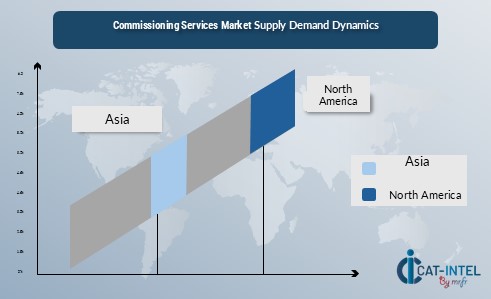
The Image shows growing demand for commissioning services in both Asia Pacific and North America with potential price increases and increased Competition.
Asia-Pacific Dominance in Commissioning Services
Asia-Pacific region, including is a dominant player in the commissioning services market. With strong demand in countries like Japan, China, and India, this region is experiencing rapid growth driven by large scale infrastructure, energy, and industrial projects.
-
Energy Transition Extensive renewable energy projects, such as solar and wind farms, across the Asia-Pacific region are driving demand for commissioning expertise. -
Infrastructure Expansion Rapid urbanization and significant infrastructure investments in transportation and smart city initiatives are bolstering the need for commissioning services. -
Technological Adoption The integration of advanced tools and automation in commissioning processes is enhancing service efficiency and scalability. -
Sustainability Practices The emphasis on sustainable and energy-efficient systems aligns with regional goals, driving demand for commissioning services with a sustainability focus.
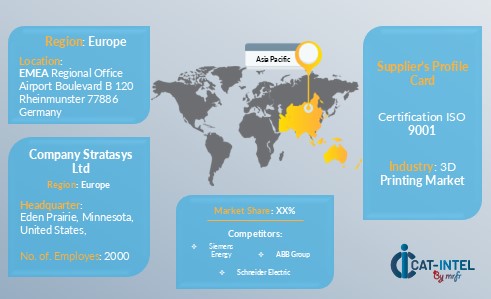
Asia Pacific Remains a key hub, commissioning Services price drivers Innovation and Growth.
Supplier Landscape Supplier Negotiations and Strategies
The supplier landscape in the commissioning services industry across the highly competitive, consisting of a mix of large multinational firms and smaller, specialized providers. These suppliers significantly influence market dynamics, including pricing, service quality, and resource availability. The market features global players with extensive regional operations and niche providers offering tailored solutions such as sustainable commissioning practices, advanced diagnostic tools, or expertise in specific industries like energy or infrastructure.
While established multinational companies dominate the industry, emerging players are carving out market niches by focusing on innovative technologies, digital tools, and sustainable commissioning processes. The increasing emphasis on compliance with industry regulations, ethical practices, and supply chain transparency is prompting suppliers to adapt their strategies to meet evolving market demands.
Key Suppliers in the Commissioning Services Market Include
- Siemens Energy
- Schneider Electric
- ABB Group
- Honeywell Building Solutions
- Fluor Corporation
- Wood Group
- Jacobs Engineering
- Technip Energies
- Yokogawa Electric Corporation
- Emerson Process Management
Key Developments Procurement Category Significant Development
Significant Development |
Description |
Market Growth |
The commissioning services industry is experiencing consistent growth, driven by increasing demand in sectors such as energy, infrastructure, and industrial automation. |
Sustainable Practices |
Rising emphasis on sustainable commissioning methods, such as energy-efficient systems and eco-friendly materials, to comply with environmental regulations. |
Service Diversification |
Expansion of commissioning services to include specialized solutions for renewable energy, industrial automation, and infrastructure projects. |
Technological Innovations |
Implementation of advanced tools and digital technologies, such as automated testing systems and remote monitoring, improving efficiency and accuracy. |
Project Management Advancements |
Increasing use of digital platforms to streamline project planning, resource allocation, and execution, ensuring seamless delivery and enhanced collaboration. |
Focus on Efficiency |
Growing demand for efficient commissioning processes with shorter lead times, alongside real-time performance tracking to enhance operational management. |
Commissioning Services Attribute/Metric |
Details |
Market Sizing |
The global commissioning services market is projected to reach USD 9365.12 Million by 2032, growing at a CAGR of approximately 6.49% from 2024 to 2032. |
Technology Adoption Rate in Commissioning |
Approximately 40% of commissioning firms in the Asia-Pacific region are adopting advanced technologies like automation, digital tools, and IoT-based monitoring systems. |
Top Commissioning Strategies for 2024 |
Focus on integrating digital tools, enhancing energy efficiency, implementing real-time monitoring systems, and expanding specialized commissioning services. |
Commissioning Process Automation |
Around 30% of companies have implemented automation in commissioning activities, including testing, validation, and performance monitoring, to improve precision and reduce lead times. |
Commissioning Market Challenges |
Key challenges include fluctuating material costs, adapting to renewable energy systems, and meeting stringent regulatory and sustainability requirements. |
Key Suppliers |
Major suppliers in the commissioning services market include Siemens Energy, ABB Group, and Schneider Electric, offering diverse solutions across industries. |
Key Regions Covered |
Prominent regions driving demand include Australia, India, and China, supported by large-scale energy, infrastructure, and industrial projects. |
Market Drivers and Trends |
Growth is fueled by advancements in automation, demand for renewable energy integration, and increasing emphasis on sustainable and energy-efficient systems. |










